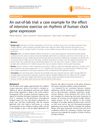 January 2021 in “Research Square (Research Square)”
January 2021 in “Research Square (Research Square)” Women with PCOS have different levels of certain metabolites in their blood, which could help diagnose and predict the condition.
 May 2024 in “Skin research and technology”
May 2024 in “Skin research and technology” Certain metabolites can either protect against or increase the risk of hair loss.
 29 citations,
November 2022 in “Nature Medicine”
29 citations,
November 2022 in “Nature Medicine” Genetic variations greatly affect individual metabolism and can impact health and disease risk.
 1 citations,
January 2023 in “Metabolites”
1 citations,
January 2023 in “Metabolites” Changes in gut bacteria can contribute to the development of Polycystic Ovary Syndrome (PCOS), affecting metabolism, immunity, and causing inflammation. Treatments may involve adjusting these factors.
9 citations,
May 2021 in “Frontiers in aging neuroscience” Taking triterpenoids from Ganoderma lucidum over a long time can help slow down brain aging and improve overall health in mice.
 21 citations,
September 2013 in “Journal of circadian rhythms”
21 citations,
September 2013 in “Journal of circadian rhythms” Intense exercise at night can delay the body's internal clock gene expression by 2 to 4 hours.
 14 citations,
November 2015 in “Annals of the New York Academy of Sciences”
14 citations,
November 2015 in “Annals of the New York Academy of Sciences” Changing the diet of mice lacking the enzyme CBS can affect symptoms related to the genetic condition.
 2 citations,
November 2023 in “Frontiers in microbiology”
2 citations,
November 2023 in “Frontiers in microbiology” The health of the gut may be important in developing new ways to prevent, diagnose, and treat alopecia areata.
 29 citations,
January 2014 in “Frontiers in physiology”
29 citations,
January 2014 in “Frontiers in physiology” Understanding and tracking our body's natural daily rhythms could help improve heart health.
14 citations,
September 2021 in “International journal of molecular sciences” Zinc pyrithione needs targeted delivery to the scalp for effective dandruff treatment.
 1 citations,
August 2022 in “Biomedicines”
1 citations,
August 2022 in “Biomedicines” Dutasteride, usually used for prostate issues and hair loss, could potentially treat Amyotrophic Lateral Sclerosis (ALS) due to its neuroprotective, antioxidant, and anti-inflammatory properties, but more testing is needed.
 January 2024 in “Journal of the Endocrine Society”
January 2024 in “Journal of the Endocrine Society” The research found that measuring androgens in urine can give extra information about body metabolism and is linked to androgen levels in the blood, especially in young girls.
 August 2024 in “Skin Research and Technology”
August 2024 in “Skin Research and Technology” Omega-6 and LDL cholesterol increase the risk of hair loss.
 December 2023 in “Frontiers in microbiology”
December 2023 in “Frontiers in microbiology” Mannan oligosaccharides improve raccoon dogs' fur quality and overall health.
 2 citations,
February 2016 in “African Journal of Traditional Complementary and Alternative Medicines”
2 citations,
February 2016 in “African Journal of Traditional Complementary and Alternative Medicines” Prolonged linseed ingestion is safe for rabbits.
5 citations,
September 2012 in “BMJ case reports” Ashwagandha may improve hormone levels and reduce hair loss in non-classical adrenal hyperplasia.
 24 citations,
October 1994 in “Fertility and Sterility”
24 citations,
October 1994 in “Fertility and Sterility” People with hair loss may have different levels of certain hormones due to changes in hormone processing.
 27 citations,
April 2013 in “Reviews in endocrine and metabolic disorders”
27 citations,
April 2013 in “Reviews in endocrine and metabolic disorders” The document concludes that using LC-MS/MS for measuring androgens is more accurate than older methods, but it needs careful validation and standardized references to be most effective.
 1 citations,
December 2021 in “Pakistan biomedical journal”
1 citations,
December 2021 in “Pakistan biomedical journal” Eating certain seeds may help reduce symptoms of Polycystic Ovary Syndrome.
23 citations,
June 2019 in “Bioanalysis” Monitoring steroid hormones in blood can better detect testosterone doping.
 3 citations,
May 1990 in “Journal of Steroid Biochemistry”
3 citations,
May 1990 in “Journal of Steroid Biochemistry” Some women with excess hair growth have a hormone condition that can't be diagnosed by blood or urine tests alone.
 2 citations,
May 2022 in “Diagnostics”
2 citations,
May 2022 in “Diagnostics” Vitamin D levels in hair don't match those in blood, so hair isn't a reliable indicator of Vitamin D status.
 48 citations,
February 2008 in “Nutrition in Clinical Practice”
48 citations,
February 2008 in “Nutrition in Clinical Practice” Dietary changes, including weight loss and a balanced diet, are important for managing PCOS, especially in overweight women.
 30 citations,
January 2016 in “Journal of Pharmaceutical and Biomedical Analysis”
30 citations,
January 2016 in “Journal of Pharmaceutical and Biomedical Analysis” The research found different metabolism changes in PCOS patients and suggested new potential markers for diagnosing PCOS with or without insulin resistance.
 249 citations,
November 2003 in “Clinical endocrinology”
249 citations,
November 2003 in “Clinical endocrinology” Insulin resistance is a key factor in polycystic ovary syndrome, but genetics may also contribute.
 52 citations,
June 2013 in “The Journal of Clinical Endocrinology and Metabolism”
52 citations,
June 2013 in “The Journal of Clinical Endocrinology and Metabolism” The research found that anovulatory young women have higher androgen and hormone levels than those who ovulate, suggesting immature hormonal regulation rather than a specific condition.
 34 citations,
February 2013 in “The Journal of Clinical Endocrinology and Metabolism”
34 citations,
February 2013 in “The Journal of Clinical Endocrinology and Metabolism” Many young Italian women have hyperandrogenic disorders like PCOS, which are linked to age, body weight, and insulin resistance.
 30 citations,
March 2015 in “Clinical Endocrinology”
30 citations,
March 2015 in “Clinical Endocrinology” Young women with high male hormone levels or PCOS often feel more psychological distress and have a lower quality of life.
 4 citations,
July 2019 in “Children (Basel)”
4 citations,
July 2019 in “Children (Basel)” The review concludes that more research is needed to better improve the health outcomes for people with Polycystic Ovarian Syndrome.
 December 2023 in “Frontiers in endocrinology”
December 2023 in “Frontiers in endocrinology” Excess androgens may cause PCOS, not just be a symptom.


























